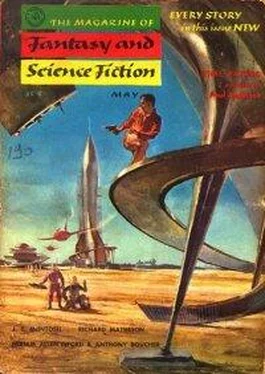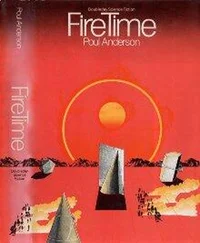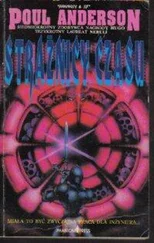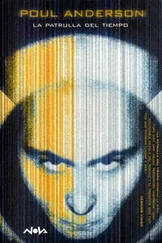Poul Anderson - Time Patrol
Здесь есть возможность читать онлайн «Poul Anderson - Time Patrol» весь текст электронной книги совершенно бесплатно (целиком полную версию без сокращений). В некоторых случаях можно слушать аудио, скачать через торрент в формате fb2 и присутствует краткое содержание. Год выпуска: 1955, Издательство: Fantasy House, Inc., Жанр: Альтернативная история, на английском языке. Описание произведения, (предисловие) а так же отзывы посетителей доступны на портале библиотеки ЛибКат.
- Название:Time Patrol
- Автор:
- Издательство:Fantasy House, Inc.
- Жанр:
- Год:1955
- ISBN:нет данных
- Рейтинг книги:4 / 5. Голосов: 1
-
Избранное:Добавить в избранное
- Отзывы:
-
Ваша оценка:
- 80
- 1
- 2
- 3
- 4
- 5
Time Patrol: краткое содержание, описание и аннотация
Предлагаем к чтению аннотацию, описание, краткое содержание или предисловие (зависит от того, что написал сам автор книги «Time Patrol»). Если вы не нашли необходимую информацию о книге — напишите в комментариях, мы постараемся отыскать её.
Time Patrol — читать онлайн бесплатно полную книгу (весь текст) целиком
Ниже представлен текст книги, разбитый по страницам. Система сохранения места последней прочитанной страницы, позволяет с удобством читать онлайн бесплатно книгу «Time Patrol», без необходимости каждый раз заново искать на чём Вы остановились. Поставьте закладку, и сможете в любой момент перейти на страницу, на которой закончили чтение.
Интервал:
Закладка:
Everard stepped out of the time shuttle—a big, featureless metal box—with a dryness in his throat. It felt like his first day in the Army, twelve years ago—or fifteen to twenty million years in the future, if you preferred—lonely and helpless, and wishing desperately for some honorable way to go home. It was a small comfort to see the other shuttles, discharging a total of fifty-odd young men and women. The recruits moved slowly together, forming an awkward clump. They didn’t speak at first, but stood staring at each other. Everard recognized a Hoover collar and a bowler; the styles of dress and hairdo moved up through 1954 and on. Where was she from, the girl with the iridescent, close-fitting culottes and the green lipstick and the fantastically waved yellow hair? No… when?
A man of about twenty-five happened to stand beside him: obviously British, from the threadbare tweeds and the long, thin face. He seemed to be hiding a truculent bitterness under his mannered exterior. “Hello,” said Everard. “Might as well get acquainted.” He gave his name and origin.
“Charles Whitcomb, London, 1947,” said the other shyly. “I was just demobbed—R.A.F.—and this looked like a good chance. Now I wonder.”
“It may be,” said Everard, thinking of the salary. Fifteen thousand a year to start with! How did they figure years, though? Must be in terms of one’s actual duration-sense.
A man strolled in their direction. He was a slender young fellow in a skin-tight gray uniform with a deep-blue cloak which seemed to twinkle, as if it had stars sewn in. His face was pleasant, smiling, and he spoke genially with a neutral accent: “Hello, there! Welcome to the Academy. I take it you all know English?” Everard noticed a man in the shabby remnants of a German uniform, and a Hindu, and others who were probably from several foreign countries.
“We’ll use English, then, till you’ve all learned Temporal.” The man lounged easily, hands on his hips. “My name is Dard Kelm. I was born in—let me see—9573 Christian reckoning, but I’ve made a specialty of your period. Which, by the way, extends from 1850 to 2000, though you’re all from some in-between years. I’m your official wailing wall, if something goes wrong.
“This place is run along different lines from what you’ve probably been expecting. We don’t turn out men en masse, so the elaborate discipline of a classroom or an army is not required. Each of you will have individual as well as general instruction. We don’t need to punish failure in studies, because the preliminary tests have guaranteed there won’t be any and made the chance of failure on the job small. Each of you has a high maturity rating in terms of your particular cultures. However, the variation in aptitudes means that if we’re to develop each individual to the fullest, there must be personal guidance.
“There’s little formality here beyond normal courtesy. You’ll have chances for recreation as well as study. We never expect more of you than you can give. I might add that the hunting and fishing are still pretty good even in this neighborhood, and if you fly just a few hundred miles they’re fantastic.
“Now, if there aren’t any questions, please follow me and I’ll get you settled.”
Dard Kelm demonstrated the gadgets in a typical room. They were the sort you would have expected by, say, 2000 A.D.: unobtrusive furniture readily adjusted to a perfect fit, refresher cabinets, screens which could draw on a huge library of recorded sight and sound for entertainment. Nothing too advanced, as yet. Each cadet had his own room in the “dormitory” building; meals were in a central refectory, but arrangements could be made for private parties. Everard felt the tension easing within him.
A welcoming banquet was held. The courses were familiar but the silent machines which rolled up to serve them were not. There was wine, beer, an ample supply of tobacco. Maybe something had been slipped into the food, for Everard felt as euphoric as the others. He ended up beating out boogie on a piano while half a dozen people made the air hideous with attempts at song.
Only Charles Whitcomb held back. Sipping a moody glass over in a corner by himself, Dard Kelm was tactful and did not try to force him into joining.
Everard decided he was going to like it. But the work and the organization and the purpose were still shadows.
“Time travel was discovered at a period when the Chorite Heresiarchy was breaking up,” said Kelm, in the lecture hall. “You’ll study the details later; for now, take my word that it was a turbulent age, when commercial and genetic rivalry was a tooth-and-claw matter between giant combines; anything went, and the various governments were pawns in a galactic game. The time effect was the by-product of a search for a means of instantaneous transportation, which some of you will realize requires infinitely discontinuous functions for its mathematical description… as does travel into the past. I won’t go into the theory of it—you’ll get some of that in the physics classes—but merely state that it involves the concept of infinite-valued relationships in a continuum of 4N dimensions, where N is the total number of particles in the universe.
“Naturally, the group which discovered this, the Nine, were aware of the possibilities. Not only commercial—trading, mining, and other enterprises you can readily imagine—but the chance of striking a death-blow at their enemies. You see, time is variable; the past can be changed—”
“Question!” It was the girl from 1972, Elizabeth Gray, who was a rising young physicist in her own period.
“Yes?” said Kelm politely.
“I think you’re describing a logically impossible situation. I’ll grant the possibility of time travel, seeing that we’re here, but an event cannot both have happened and not happened. That’s self-contradictory.”
“Only if you insist on a logic which is not Aleph-sub-Aleph-valued,” said Kelm. “What happens is like this: suppose I went back in time and prevented your father from meeting your mother. You would never have been born. That portion of universal history would read differently; it would always have been different, though I would retain memory of the ‘original’ state of affairs.”
“Well, how about doing the same to yourself?” asked Elizabeth. “Would you cease existing?”
“No, because I would belong to the section of history prior to my own intervention. Let’s apply it to you. If you went back to, I would guess, 1946, and worked to prevent your parents’ marriage in 1947, you would still have existed in that year; you would not go out of existence just because you had influenced events. The same would apply even if you had only been in 1946 one microsecond before shooting the man who would otherwise have become your father.”
“But then I’d exist without—without an origin!” she protested. “I’d have life, and memories, and… everything… though nothing had produced them.”
Kelm shrugged. “What of it? You insist that the causal law, or strictly speaking the conservation-of-energy law, involve only continuous functions. Actually, discontinuity is entirely possible.”
He laughed and leaned on the lectern. “Of course, there are impossibilities,” he said. “You could not be your own mother, for instance, because of sheer genetics. If you went back and married your former father, the children would be different, none of them you, because each would have only half your chromosomes.”
Clearing his throat: “Let’s not stray from the subject. You’ll learn the details in other classes. I’m only giving you a general background. To continue: the Nine saw the possibility of going back in time and preventing their enemies from ever having gotten started, even from ever being born. But then the Danellians appeared.”
Читать дальшеИнтервал:
Закладка:
Похожие книги на «Time Patrol»
Представляем Вашему вниманию похожие книги на «Time Patrol» списком для выбора. Мы отобрали схожую по названию и смыслу литературу в надежде предоставить читателям больше вариантов отыскать новые, интересные, ещё непрочитанные произведения.
Обсуждение, отзывы о книге «Time Patrol» и просто собственные мнения читателей. Оставьте ваши комментарии, напишите, что Вы думаете о произведении, его смысле или главных героях. Укажите что конкретно понравилось, а что нет, и почему Вы так считаете.












